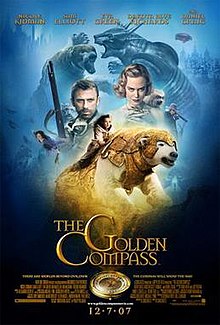The Golden Compass (film)
| The Golden Compass | |
|---|---|

Theatrical release poster
|
|
| Directed by | Chris Weitz |
| Produced by | Bill Carraro Deborah Forte |
| Screenplay by | Chris Weitz |
| Based on |
Northern Lights by Philip Pullman |
| Starring | |
| Music by | Alexandre Desplat |
| Cinematography | Henry Braham |
| Edited by | |
|
Production
company |
|
| Distributed by | New Line Cinema (US) Entertainment Film Distributors (UK) |
|
Release date
|
|
|
Running time
|
113 minutes |
| Country | United States United Kingdom |
| Language | English |
| Budget | $180 million |
| Box office | $372 million |
The Golden Compass is a 2007 British-American fantasy-adventure film based on Northern Lights, the first novel in Philip Pullman's trilogy His Dark Materials. Written and directed by Chris Weitz, it stars Dakota Blue Richards, Daniel Craig, Eva Green, Tom Courtenay, Christopher Lee, Nicole Kidman and Sam Elliott. The project was announced in February 2002, but difficulties over the script and the selection of a director caused significant delays. At US$180 million, it was one of New Line Cinema's most expensive projects ever, and its disappointing results in the USA contributed to New Line's February 2008 restructuring.
The film depicts the adventures of Lyra Belacqua, an orphan living in a parallel universe on a world that looks much like our own. In Lyra's world, a dogmatic ruling power called the Magisterium opposes free inquiry. Poor, orphan, and Gyptian children are disappearing at the hands of a group the children call the Gobblers. When Lyra discovers that Mrs. Coulter is running the Gobblers, she flees. Rescued by the Gyptians, Lyra joins them on a trip to the far north, to the land of the armored polar bears, in search of the missing children.
Before its release, the film received criticism from secularist organisations and fans of His Dark Materials for the dilution of elements of the story which were critical of religion, as well as from some religious organisations for the source material's anti-Catholic themes. The studio ordered significant changes late in post-production, which Weitz later called a "terrible" experience. Although the film's visual effects (which Weitz has called the film's "most successful element") won both a BAFTA and an Academy Award, critical reception was mixed and revenue lower than anticipated.
...
Wikipedia
